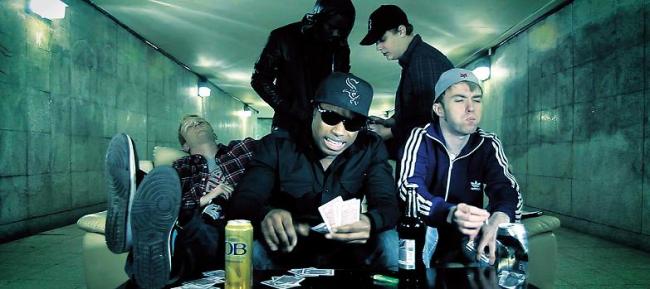One such opportunity to make music is Black Swan Audio, started by sound engineer Geoff Nostrant. He provides recording, mixing and mastering services for a variety of artists, but works with a lot of the expat artists in Korea now.
“There’s so much talent here,” he said, adding that working with these artists is about more than just recording music, his passion, but about getting to know each one. He said many are “talented and dedicated.”
G-MO, an artist from Los Angeles who came to Korea in 2009, said this talent, as well as the diversity, is part of what makes the scene in Korea different.
“The diversity of the expat hip-hop community is what makes it unique,” he said. “To me, it seems like the hip-hop scene has gotten better. There are a lot of venues for artists to perform at and the expat community embraces artists.”
Part of that is thanks to singer Hannah Kamau, who started Itaewon Open Mic last summer and CLASH, a rock/hip-hop charity concert that brings together Koreans and expats, before she returned to the U.S. in March 2012.
“The scene was bursting with talent, but there was a lack of coherence,” she said. “I was blessed to be able to become a part of the coming together of a community of artists. I hope that continues for a long time.”
But while things are getting better for expat hip-hop, it is still only really popular among foreigners, and several things stand in the way of it growing into the Korean music industry ― the biggest being the language barrier.
Hip-hop artist Black Ilumin, the only foreigner signed to a Korean label, says that even for established artists, it’s an obstacle, since emceeing is the most limited out of all the elements in hip-hop.
“That’s what hurts, we’re speaking a language and our voice is our instrument. But the majority of the country does not understand what we’re saying. So that’s a huge, huge obstacle that we have to overcome,” he said.
Long-time expat rapper Bnews agreed.
“For the most part you can go rock a stage and most are just happy to see you perform, so it looks good. But do they really understand, get the message of the song? It’s always been my concern because when I spit I want you to hear all the punches and understand them,” he said.
Another obstacle is the glass ceiling for foreign performers in Korea.
“It’s tough if you’re not Korean. Because they’re like, ‘Why are you coming to my country trying to make money off us when you can do this in your own country?’” Pinnacle TheHustler said.
“It’s like, we (Koreans) can put the token foreigner in one of our music videos, or maybe one of our movies, or maybe even have a foreigner play a feature role occasionally just to show a little bit of change. But to have someone actually represent something in Korea, I think that’s one of the biggest obstacles yet to be overcome in Korea.”
This was why the artist started Planet Hustle last year. The company helps artists with anything they may need ― recording, music videos, graphic design, website, booking, public relations and much more.
“There are a lot of artists that just don’t know what to do when it comes to maneuvering in the entertainment industry. They know how to make the music, but they don’t know how to do the business,” he said.
“You always hear that it’s lonely at the top, but I never understood: why don’t people just bring other people up with them? Then you won’t be so lonely. … If I grow, you grow with me.”
Despite the bumps along the way, many artists are still optimistic about the future of expat hip-hop, saying it will continue to grow and hopefully expand to include more collaboration with the Korean underground hip-hop scene.
“There are already collaborations going on. But I feel there is going to be even more of a push,” Pinnacle TheHustler said.
He said that he believes future generations of Koreans will be more open and appreciative of quality art, whether it’s coming from a Korean or a foreigner.
“I think that 20 years from now Korea is going to be one of the dopest places to live because the generation that’s growing up now is more multicultural ― they’re traveling more, studying abroad more often. They’re multilingual, they have their views on the world that are not as constrained as those in previous generations,” he said.
Nostrant of Black Swan said the Korean mainstream would hopefully open up fully to expat music, something already happening through Korean artists. He said the progress is moving faster, though slow and steady, which is one reason why after 10 years in Korea he still has no plans to leave.
“I’d rather not leave. It’s becoming a storm now, but it’ll be a tornado in the future,” he said.
By Emma Kalka (
ekalka@heraldcorp.com)








